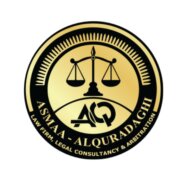Best Media, Technology and Telecoms Lawyers in Qatar
Share your needs with us, get contacted by law firms.
Free. Takes 2 min.
Or refine your search by selecting a city:
List of the best lawyers in Qatar
About Media, Technology and Telecoms Law in Qatar
The landscape of Media, Technology, and Telecommunications (MTT) in Qatar is governed by an evolving set of regulations aimed at fostering innovation while ensuring security and cultural integrity. Qatar has invested heavily in digital infrastructure and media development, aligning with its National Vision 2030 to build a knowledge-based economy. The key regulatory bodies include the Ministry of Transport and Communications, the Communications Regulatory Authority (CRA), and the Qatar Media Corporation, which oversee the licensing, operational guidelines, and compliance requirements for companies and individuals operating in this sector.
Why You May Need a Lawyer
Legal assistance in the MTT sector may be required in numerous contexts:
- Compliance and Regulatory Advice: Ensuring adherence to local laws and regulations to avoid penalties or business disruptions.
- Intellectual Property Protection: Safeguarding innovative technologies, digital content, and proprietary software through patents, copyrights, and trademarks.
- Contracts and Agreements: Drafting and negotiating contracts between service providers, clients, and partners.
- Data Protection and Privacy: Navigating laws concerning consumer data and digital privacy in business operations.
- Dispute Resolution: Handling conflicts that arise from breaches of agreements or intellectual property rights.
- Cybersecurity Issues: Addressing legal implications of cybersecurity breaches and implementing preventative measures.
Local Laws Overview
Several key laws impact the MTT sector in Qatar:
- Qatar Communications Law: Regulates licensing, competition, and consumer protection in telecommunications.
- Cybercrime Prevention Law: Provides a framework for prosecuting cybercrimes and protecting data integrity.
- Personal Data Privacy Protection Law: Establishes the guidelines for data processing and personal data protection.
- Intellectual Property Laws: Protect creative and technological innovations and facilitate enforcement of IP rights.
- Media Law: Governs media content production, broadcast rights, and restrictions on content deemed inappropriate.
Frequently Asked Questions
What are the licensing requirements for operating a telecom company in Qatar?
Telecom companies in Qatar must obtain a license from the Communications Regulatory Authority, which oversees tariffs, service quality, and ensures fair competition.
How can I protect my digital content under Qatari law?
Digital content can be protected under Qatar's copyright laws, registering with the Intellectual Property Protection Office is recommended for enforcement actions.
What penalties exist for data privacy violations?
Violating Qatar’s data privacy laws can result in substantial fines and legal action depending on the severity and impact of the breach.
How does Qatar regulate online media platforms?
Online media platforms in Qatar are subject to the same content regulations as traditional media, with additional restrictions on online data handling and privacy.
What steps should I take if my intellectual property is infringed upon?
If you suspect infringement, document the violation, and consult with a lawyer who can guide you through the legal process for enforcement and possible litigation.
How do I ensure compliance with local cybersecurity laws?
Businesses can ensure compliance by implementing robust cybersecurity measures, conducting regular audits, and understanding obligations under the Cybercrime Prevention Law.
Can foreign companies own media businesses in Qatar?
Foreign ownership in media companies is subject to specific restrictions and typically requires a local partnership or sponsorship.
What legal issues should a startup in the tech sector anticipate?
Startups should focus on compliance with data protection laws, securing intellectual property rights, and drafting appropriate contracts and agreements.
How are disputes typically resolved in the MTT sector?
Disputes can be resolved through negotiation, mediation, or arbitration as per the agreements between the parties or through the Qatari courts.
What role do governmental bodies play in technological advancements?
Governmental bodies provide regulatory guidance, support innovation through funding initiatives, and set standards to align with national development goals.
Additional Resources
Below are some additional resources that may be helpful:
- Communications Regulatory Authority (CRA): Offers guidance on telecom regulations and provides licensing information.
- Ministry of Transport and Communications: Oversees the overall strategy in technology and media sectors.
- Intellectual Property Protection Office: Responsible for registering and protecting IP rights in Qatar.
- Qatar Information Technology Policy and Strategy (QITCOM): Provides resources and strategy direction for IT developments.
Next Steps
If you need legal assistance in the MTT sector in Qatar, consider the following steps:
- Identify Your Needs: Clearly outline the type of legal assistance you require.
- Research Law Firms: Look for firms or lawyers specialized in media, technology, and telecoms law.
- Consult Professionals: Seek initial consultations to understand how a lawyer can help with your specific case.
- Prepare Documentation: Gather all necessary documents related to your issue to facilitate informed legal advice.
- Understand Fees: Discuss and agree on fees upfront to avoid surprises later.
Engaging a specialized lawyer will ensure that your interests are well-represented and that you can successfully navigate the legal landscape in Qatar's MTT sector.
Lawzana helps you find the best lawyers and law firms in Qatar through a curated and pre-screened list of qualified legal professionals. Our platform offers rankings and detailed profiles of attorneys and law firms, allowing you to compare based on practice areas, including Media, Technology and Telecoms, experience, and client feedback.
Each profile includes a description of the firm's areas of practice, client reviews, team members and partners, year of establishment, spoken languages, office locations, contact information, social media presence, and any published articles or resources. Most firms on our platform speak English and are experienced in both local and international legal matters.
Get a quote from top-rated law firms in Qatar — quickly, securely, and without unnecessary hassle.
Disclaimer:
The information provided on this page is for general informational purposes only and does not constitute legal advice. While we strive to ensure the accuracy and relevance of the content, legal information may change over time, and interpretations of the law can vary. You should always consult with a qualified legal professional for advice specific to your situation.
We disclaim all liability for actions taken or not taken based on the content of this page. If you believe any information is incorrect or outdated, please contact us, and we will review and update it where appropriate.
Browse media, technology and telecoms law firms by service in Qatar
Qatar Attorneys in related practice areas.
Browse media, technology and telecoms law firms by city in Qatar
Refine your search by selecting a city.











